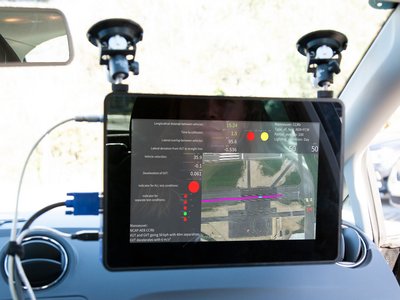Optimizing Lane Keeping Assistants with DEWETRON's Advanced Test System
Lane Keeping Assistants (LKAS) represent one of the most complex challenges in developing Advanced Driver Assistance Systems (ADAS). This article explores how DEWETRON, a leading manufacturer of comprehensive test and measurement systems, has developed an innovative solution for automotive manufacturers to gather critical data for LKAS development. The system leverages Alvium 1800 U-240c cameras for high-quality image acquisition.
Time Synchronous Data Acquisition
The cornerstone of effective LKAS testing is time-synchronized data acquisition across all sensor types, including analog signals, video imagery, and digital inputs from inertial measurement units (IMUs), steering systems, and other sources. This requires capturing multiple critical parameters with exceptional precision:
- The exact position of the vehicle under test (VUT) via IMUs
- Real-time bus data from the vehicle’s internal network
- Distance measurements to lane boundaries and adjacent vehicles
This synchronized approach ensures that all data streams maintain proper temporal alignment, enabling accurate post-processing validation. Time-synchronized video acquisition from multiple perspectives is essential for verifying data plausibility during analysis.
Precise Triggering Mechanism
The Alvium 1800 U-240c cameras provide critical precision through their support for LVTTL triggering signals generated by the DEWETRON acquisition system. This synchronization capability ensures perfect temporal alignment between video frames and other sensor data streams along a unified time axis.
For multi-vehicle testing scenarios, each vehicle is equipped with its own DEWETRON acquisition system, interconnected via a mobile distributed architecture using WiFi. External cameras are strategically mounted on all test vehicles to capture longitudinal position data relative to track boundaries and inter-vehicle distances.
High-Bandwidth Synchronization
The system captures high-definition video from four tire positions across three vehicles at frame rates exceeding 50 fps, ensuring sufficient data for comprehensive post-processing validation of video plausibility. The USB 3.0 interface offers significant advantages by eliminating the need for separate power and connection management.
This design choice represents an important optimization over previous GigE-based systems that consumed valuable network bandwidth. By utilizing USB 3.0 cameras, more ethernet bandwidth becomes available for other data sources without compromising system performance.
Alvium 1800 U-240c: Industrial Performance at Competitive Pricing
The Alvium 1800 U-240c camera delivers exceptional industrial-grade performance with its Sony IMX392 sensor supporting up to 126 frames per second in 2.4 MP resolution. The device features a rugged Micro-B USB 3.1 Gen 1 connector with screw locks for reliable operation.
Available in multiple housing configurations and lens mount options, these cameras offer versatile integration possibilities. Their compact design allows flexible positioning within test setups regardless of space constraints.
Key Advantages
- Exceptional frame rate performance (126 fps)
- Rugged industrial-grade construction
- Flexible installation and configuration options
- Comprehensive connectivity solutions
The Vimba Viewer software enables rapid camera detection and setup, minimizing integration time while ensuring reliable operation in demanding test environments.
For further technical details about the Alvium 1800 U-240c cameras, please refer to the manufacturer documentation.
Last Updated: 2025-09-04 16:30:07
